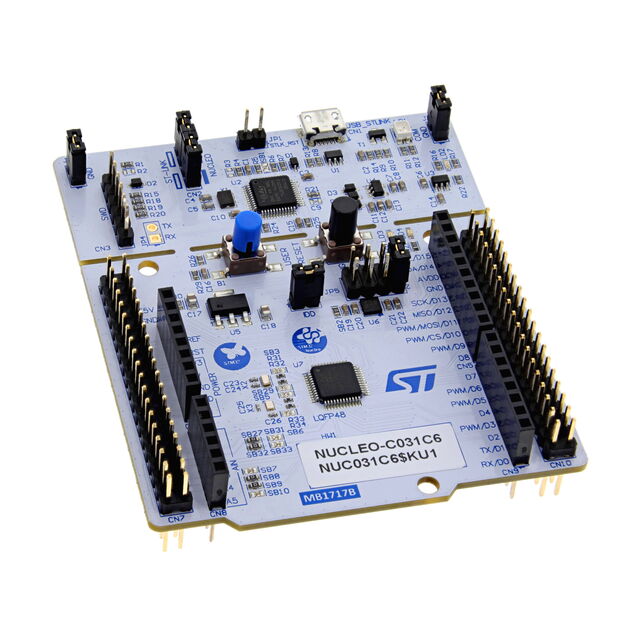
NUCLEO-C031C6
ActiveSTM32 NUCLEO-64 DEVELOPMENT BOARD WITH STM32C031C6 MCU, SUPPORTS ARDUINO AND ST MORPHO CONNECTIVITY
Deep-Dive with AI
Search across all available documentation for this part.

NUCLEO-C031C6
ActiveSTM32 NUCLEO-64 DEVELOPMENT BOARD WITH STM32C031C6 MCU, SUPPORTS ARDUINO AND ST MORPHO CONNECTIVITY
Deep-Dive with AI
Technical Specifications
Parameters and characteristics for this part
| Specification | NUCLEO-C031C6 |
|---|---|
| Board Type | Evaluation Platform |
| Contents | Board(s) |
| Core Processor | ARM® Cortex®-M0+ |
| Interconnect System | ST Morpho, Arduino R3 Shield |
| Mounting Type | Fixed |
| Platform | Nucleo-64 |
| Suggested Programming Environment | STM32Cube, Keil MDK, IAR EW |
| Type | MCU 32-Bit |
| Utilized IC / Part | STM32C031 |
Pricing
Prices provided here are for design reference only. For realtime values and availability, please visit the distributors directly
| Distributor | Package | Quantity | $ | |
|---|---|---|---|---|
| Digikey | Bulk | 1 | $ 10.97 | |
Description
General part information
NUCLEO-C031C6 Series
The STM32C031x4/x6 mainstream microcontrollers are based on high-performance Arm®Cortex®-M0+ 32-bit RISC core operating at up to 48 MHz frequency. Offering a high level of integration, they are suitable for a wide range of applications in consumer, industrial and appliance domains and ready for the Internet of Things (IoT) solutions.
The devices incorporate a memory protection unit (MPU), high-speed embedded memories (12 Kbytes of SRAM and up to 32 Kbytes of flash program memory with read and write protection), DMA, an extensive range of system functions, enhanced I/Os, and peripherals. The devices offer standard communication interfaces (one I2Cs, one SPI / one I2S, and two USARTs), one 12-bit ADC (2.5 MSps) with up to 21 channels, a low-power RTC, an advanced control PWM timer, four general-purpose 16-bit timers, two watchdog timers, and a SysTick timer.
The devices operate within ambient temperatures from -40 to 125°C and with supply voltages from 2.0 V to 3.6 V. Optimized dynamic consumption combined with power-saving modes allows the design of low-power applications.


